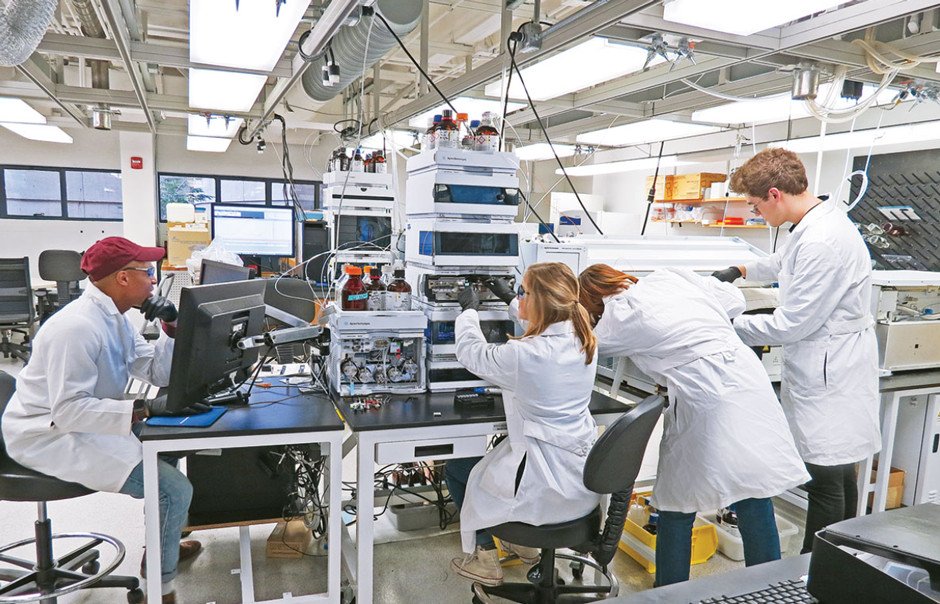Which Industries Use Mass Spectrometry?

Mass spectrometry, MS, is a powerful analytical technique that has become popular in a variety of industries. Its sophisticated instruments can analyze a range of chemical and biological compounds, including small molecules, macromolecules, or even proteins. Scientists use an MS bench to house their mass spectrometry equipment in a single location, making the analyzing process more efficient. Here is a look into the different industries that use mass spectrometry:
Pharmaceutical
Scientists use mass spectrometry in drug discovery, drug monitoring during clinical trials, and quality control. Mass spectrometry may help identify and quantify drug molecules and their metabolites. This allows them to evaluate the safety and efficiency of new drugs before they hit the market. Mass spectrometry can also verify the purity of drug ingredients, allowing patients to receive high-quality medications. Using an MS bench helps the procedures of mass spectrometry run efficiently, leading to more accurate results.
Food and Beverage
Scientists use mass spectrometry procedures to analyze various biomolecules in different food products, such as proteins, carbohydrates, and lipids. This analysis may help food scientists understand the chemical makeup of food and the way it interacts with human digestion. Mass spectrometry can also be helpful in food safety measures by detecting contaminants, such as heavy metals or pesticides, which could negatively impact public health.
Environmental
Scientists use mass spectrometry to determine the chemical composition of soil, water, and air samples. This can help identify the presence of heavy metals, organic pollutants, and other hazardous substances that could harm human health and the environment. Mass spectrometry may also help environmental scientists evaluate the effectiveness of waste remediation strategies to make sure that the environment and public health are protected.
Forensic Science
Forensic scientists use mass spectrometry to identify and quantify drugs or other compounds in forensic samples. This analytical technique may be helpful in detecting illicit drugs, preserving evidence, and providing accurate information for law enforcement investigations. Mass spectrometry is also used in toxicology. It helps toxicologists interpret post-mortem results and understand the extent of drug use or exposure in a particular case.
Petrochemical
Mass spectrometry helps scientists detect and quantify trace amounts of impurities that could negatively impact the quality of oil products. It has also been used to monitor feed and end products in real time. This can help detect any abnormalities or variations in the composition of refined or crude oil products, leading to quicker problem identification and rectification.
Material Science
Mass spectrometry has been instrumental in analyzing the material composition of polymers, including rubbers, plastics, and adhesives. This provides a deeper understanding of these materials’ physical and chemical properties. Understanding these properties can lead to scientists formulating new materials with different properties to meet specific industrial needs.
Clinical Diagnostics
Mass spectrometry has been used to diagnose various medical conditions. These conditions and diseases include metabolic disorders, cancer, and in recent times, even COVID-19. Mass spectrometry helps identify the trace elements, metabolites, and biomolecules in specific fluids such as saliva, blood, and urine. Medical scientists can use mass spectrometry to identify the biomarkers in biological samples that are indicative of a particular condition or disease.
Using Mass Spectrometry and MS Benches to Create a Better Society
Utilizing mass spectrometry in laboratory settings has various applications, such as drug discovery, environmental studies, and protein characterization. Mass spectrometry has become helpful in academic research and has revolutionized many industries. The potential of MS technology is enormous, and continued research and development are expected to broaden the scope of its application. The accurate analytical results of mass spectrometry help researchers, scientists, and analysts transform data into knowledge to improve human health and our environment.



